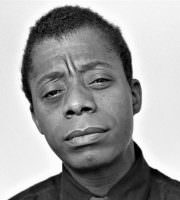About James Baldwin
James Arthur Baldwin (Harlem, New York, August 2, 1924 - Saint-Paul-de-Vence, December 1, 1987) was an African-American poet and writer, author of novels, poetry, short stories, plays and essays. His best known work is his semi-autobiographical first novel, Go Tell It on the Mountain, published in 1953, and his short story Sonny's Blues included in the collection of short stories Going to Meet the Man, published in 1965.A student at Frederick Douglass Junior High, he wrote his first article at age 13 for the school magazine, of which he became the editor. He will also work as an editor at DeWitt Clinton High School in the Bronx. After his studies, he moved to Greenwich Village, where he befriended and moved in with actor Marlon Brando. There he began writing short stories, essays and novel reviews, seeing his first work published in The Nation magazine in 1947.
A year later, tired of racial discrimination, but also in the midst of a sexual identity crisis, Baldwin left the United States for France. He made two long stays in Paris: first between 1948 and 1952, then between 1953 and 1957, after a brief stay in New York in the midst of McCarthyism. During each of these two four-year stays, he shared the miserable daily life of Algerians in the working-class district of Belleville, comparing the situation of second-class citizens in mainland France with that of his own community of origin: the ghetto of Harlem. His observations on prejudices, attachment to the culture of origin and the announced fall of the French colonial empire gave him in return keys to analyze the rise of the Civil Rights Movement in his own country and to decide on his actively engage in it. He returned to his native country in 1957 to participate in the fight for civil rights alongside Martin Luther King and Malcolm X.
His essays, collected in particular in Notes of a Native Son, (1955), Nobody Knows My Name, (1961) and The Fire Next Time, (1963), explore the unsaid and the underlying tensions around racial, gender and class distinctions within Western societies, particularly in mid-20th century America. His novels and plays transpose personal dilemmas into fiction, questioning the complex social and psychological pressures that hinder the integration not only of black people, but also of gay or bisexual men. He also depicts the internalized obstacles that prevent such quests for acceptance, for example in his novel Giovanni's Room, written in 1956, long time before the gay liberation movement.
James Baldwin deals a lot with the social pressures he has suffered throughout his life. Go Tell It On The Mountain, his best-known work, earned him immediate recognition, followed by the play The Amen Corner in 1954. During his stay in Europe he also wrote the essay Stranger in The Village (1953) in which he recounts his visit to a small Swiss village, and the ignorant racism what he felt there.
In 1970, the writer emigrated again to France, where he settled permanently in Saint-Paul-de-Vence in the south of France to an old Provençal house. Between numerous visits from his friends, including Miles Davis and Josephine Baker, James Baldwin continued to write. He wrote some of his last works in this house, notably Just Above My Head in 1979, and Evidence of Things Not Seen in 1985.
Suffering from stomach cancer, he died at the age of 63 on December 1, 1987, leaving behind several unfinished manuscripts.
Browse all poems and texts published on James Baldwin









